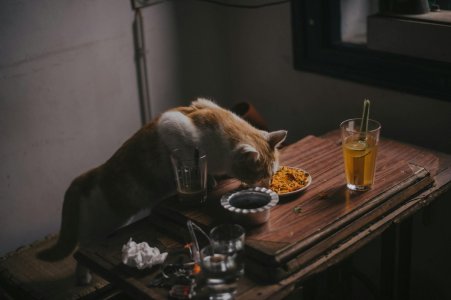Protect your feline friends: the alarming discovery in popular cat food brands
- Replies 0
The peacefulness of a pet owner's life can be quickly shattered by the news that their beloved feline's food may be the source of serious illness.
In a recent and alarming development, health officials have identified bird flu in a second brand of raw pet food, leading to the sickness of up to five house cats in California.
This unsettling discovery has raised concerns among pet owners and prompted a serious discussion about the safety of raw pet food diets.
The brand in question, Monarch Raw Pet Food, was sold at farmers markets across California, and its potential contamination with bird flu has been linked to the illness of one confirmed and four presumed cases in a single household.
This follows a tragic incident in Oregon, where a cat's death was attributed to a different brand of raw pet food.

Bird flu, or avian influenza, is not a common ailment for house cats, but when it does strike, the consequences can be severe.
Infected cats may exhibit neurological symptoms, respiratory distress, or liver disease, which can rapidly progress to a fatal outcome.
While no human cases have been linked to infected house cats, the situation underscores the need for vigilance in monitoring the health of our pets.
The Los Angeles County health officials' warning against feeding pets raw food comes on the heels of these distressing cases.
The risk of H5 bird flu to the general public is considered low, but the virus's presence in pet food is a stark reminder of the potential dangers lurking in seemingly benign products.
Historically, most human cases of bird flu in the United States have been mild, with patients recovering after antiviral treatment.
These cases have typically involved direct contact with infected poultry or livestock, not domestic pets. However, the Centers for Disease Control and Prevention (CDC) reports 66 confirmed human cases across 10 states, with California leading in numbers.
In response to these events, federal health officials have initiated nationwide testing of raw cow's milk cheese and raw milk for bird flu. This proactive measure aims to prevent further spread of the virus and protect both human and animal health.

Have you experienced any health issues with your pets that could be linked to their diet? Do you have any tips for fellow pet owners on how to choose safe and nutritious food for their animals? Share your stories and advice in the comments below!
In a recent and alarming development, health officials have identified bird flu in a second brand of raw pet food, leading to the sickness of up to five house cats in California.
This unsettling discovery has raised concerns among pet owners and prompted a serious discussion about the safety of raw pet food diets.
The brand in question, Monarch Raw Pet Food, was sold at farmers markets across California, and its potential contamination with bird flu has been linked to the illness of one confirmed and four presumed cases in a single household.
This follows a tragic incident in Oregon, where a cat's death was attributed to a different brand of raw pet food.

Health officials have warned against feeding pets raw food following the recent detection of bird flu in raw pet food brands. Image source: Pexels / Sheep.
Bird flu, or avian influenza, is not a common ailment for house cats, but when it does strike, the consequences can be severe.
Infected cats may exhibit neurological symptoms, respiratory distress, or liver disease, which can rapidly progress to a fatal outcome.
While no human cases have been linked to infected house cats, the situation underscores the need for vigilance in monitoring the health of our pets.
The Los Angeles County health officials' warning against feeding pets raw food comes on the heels of these distressing cases.
The risk of H5 bird flu to the general public is considered low, but the virus's presence in pet food is a stark reminder of the potential dangers lurking in seemingly benign products.
Historically, most human cases of bird flu in the United States have been mild, with patients recovering after antiviral treatment.
These cases have typically involved direct contact with infected poultry or livestock, not domestic pets. However, the Centers for Disease Control and Prevention (CDC) reports 66 confirmed human cases across 10 states, with California leading in numbers.
In response to these events, federal health officials have initiated nationwide testing of raw cow's milk cheese and raw milk for bird flu. This proactive measure aims to prevent further spread of the virus and protect both human and animal health.
Key Takeaways
- A second brand of raw pet food, Monarch Raw Pet Food, sold in California farmers markets, has been found to contain bird flu, resulting in sickness of up to five house cats.
- Health officials have warned against feeding pets raw food following the recent detection of bird flu in raw pet food brands.
- Cats infected with H5 bird flu can exhibit severe illness, including neurological symptoms, respiratory issues, or liver disease, which can rapidly be fatal.
- Despite the cases in cats, the risk of H5 bird flu to the general public remains low, with most human cases in the U.S. occurring in individuals who had direct contact with infected poultry or livestock.
Have you experienced any health issues with your pets that could be linked to their diet? Do you have any tips for fellow pet owners on how to choose safe and nutritious food for their animals? Share your stories and advice in the comments below!






